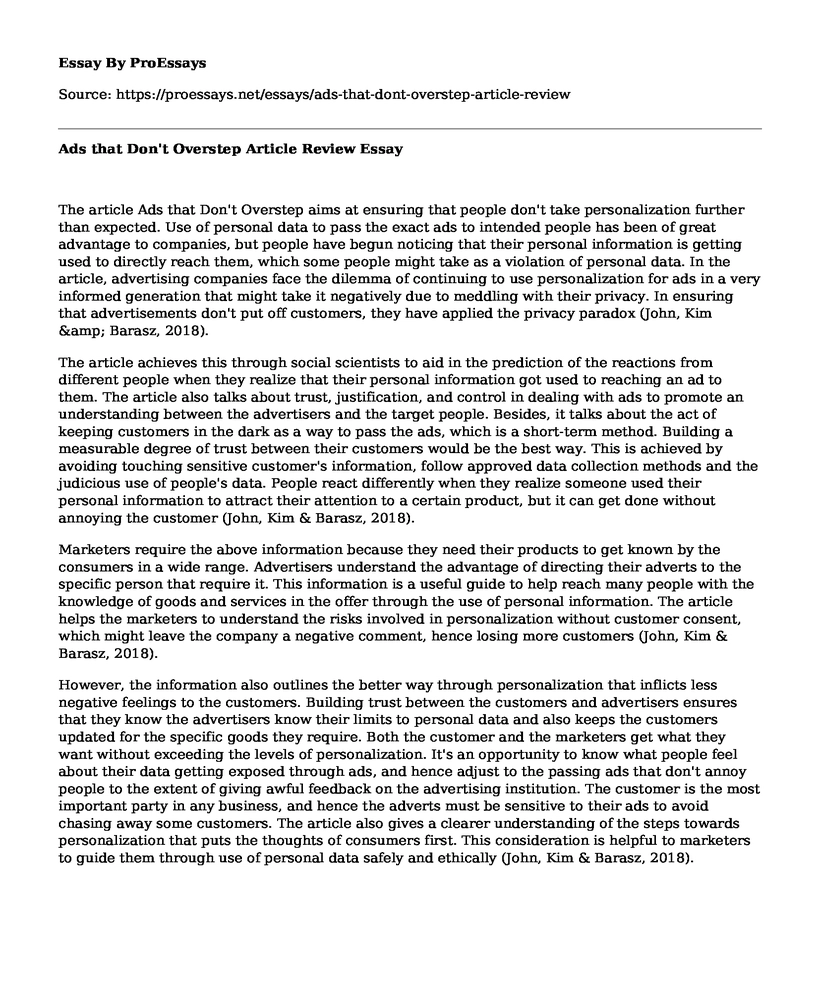The article Ads that Don't Overstep aims at ensuring that people don't take personalization further than expected. Use of personal data to pass the exact ads to intended people has been of great advantage to companies, but people have begun noticing that their personal information is getting used to directly reach them, which some people might take as a violation of personal data. In the article, advertising companies face the dilemma of continuing to use personalization for ads in a very informed generation that might take it negatively due to meddling with their privacy. In ensuring that advertisements don't put off customers, they have applied the privacy paradox (John, Kim & Barasz, 2018).
The article achieves this through social scientists to aid in the prediction of the reactions from different people when they realize that their personal information got used to reaching an ad to them. The article also talks about trust, justification, and control in dealing with ads to promote an understanding between the advertisers and the target people. Besides, it talks about the act of keeping customers in the dark as a way to pass the ads, which is a short-term method. Building a measurable degree of trust between their customers would be the best way. This is achieved by avoiding touching sensitive customer's information, follow approved data collection methods and the judicious use of people's data. People react differently when they realize someone used their personal information to attract their attention to a certain product, but it can get done without annoying the customer (John, Kim & Barasz, 2018).
Marketers require the above information because they need their products to get known by the consumers in a wide range. Advertisers understand the advantage of directing their adverts to the specific person that require it. This information is a useful guide to help reach many people with the knowledge of goods and services in the offer through the use of personal information. The article helps the marketers to understand the risks involved in personalization without customer consent, which might leave the company a negative comment, hence losing more customers (John, Kim & Barasz, 2018).
However, the information also outlines the better way through personalization that inflicts less negative feelings to the customers. Building trust between the customers and advertisers ensures that they know the advertisers know their limits to personal data and also keeps the customers updated for the specific goods they require. Both the customer and the marketers get what they want without exceeding the levels of personalization. It's an opportunity to know what people feel about their data getting exposed through ads, and hence adjust to the passing ads that don't annoy people to the extent of giving awful feedback on the advertising institution. The customer is the most important party in any business, and hence the adverts must be sensitive to their ads to avoid chasing away some customers. The article also gives a clearer understanding of the steps towards personalization that puts the thoughts of consumers first. This consideration is helpful to marketers to guide them through use of personal data safely and ethically (John, Kim & Barasz, 2018).
Conclusion
The knowledge on personalization of ads relates to the digital era of advertising in the advertising course in that it is an improvement in technology, but it must get used properly to achieve the intended goals.
References
John, L. K., Kim, T., & Barasz, K. (2018). ADS THAT DON'T OVERSTEP. HARVARD BUSINESS REVIEW, 96(1), 62-69.
Cite this page
Ads that Don't Overstep Article Review. (2022, May 17). Retrieved from https://proessays.net/essays/ads-that-dont-overstep-article-review
If you are the original author of this essay and no longer wish to have it published on the ProEssays website, please click below to request its removal:
- Essay Sample on Distribution of Goods
- Research Paper on Consumer Behavior
- Generating Campaign Messages Essay Example
- Congestion Pricing Practices and Public Acceptance Paper Example
- Consumer Behavior Models and STP Marketing Paper Example
- Ads, Culture, and Race: America's Diversity Revolutionized by Ads - Essay Sample
- Paper Sample on Amazon: From Online Bookseller to Global Retail Giant







